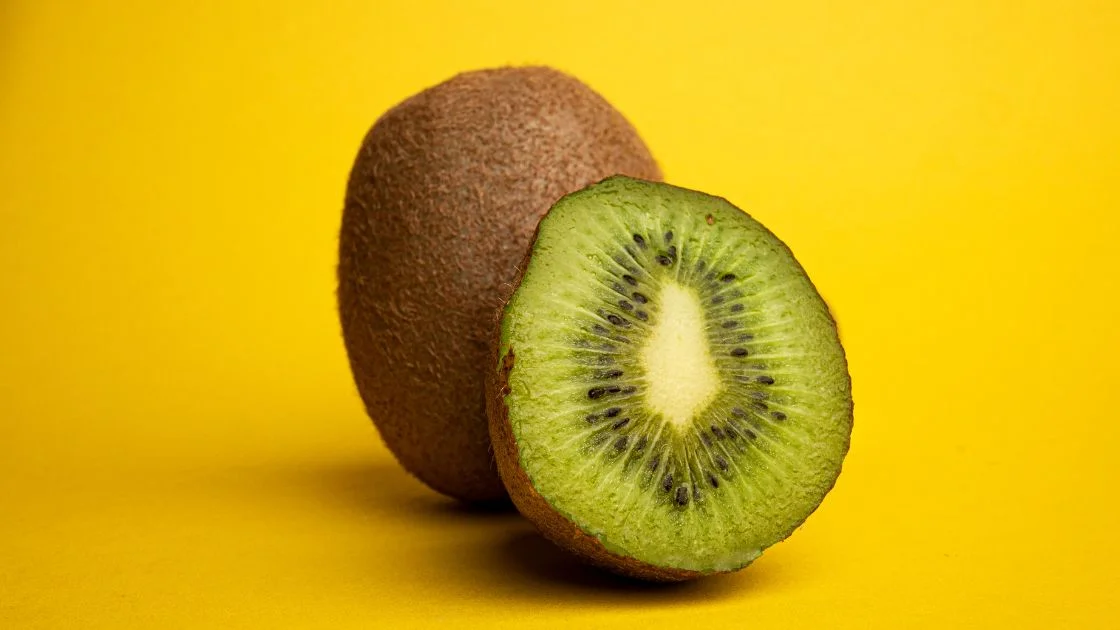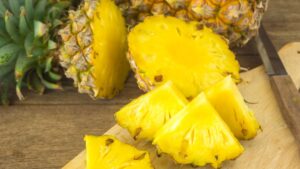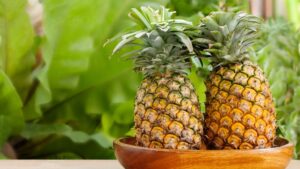Not to be confused with the little bird with the same name native to New Zealand – we won’t dedicate a page to ornithology here.
We are talking about the tasty, semi-tart fruit that was once considered exotic.
If you’re looking for a healthy and nutritious addition to your diet, kiwi fruit is a great option.
Not only does it contain an impressive amount of vitamins, antioxidants, and nutrients, but it’s also a good source of dietary fiber.
Here, we’ll discuss some of the health benefits of kiwi fruit and how it can be incorporated into an alkaline diet.
We’ll also provide tips on how to prepare it to get the most benefits.
Take a look at our recipe section that will keep you adding green to your salads and healthy desserts.
Physical Description
An unknown internet user summed it up perfectly:
This should give you a good idea of what to expect.
This is a type of small, fuzzy fruit native to New Zealand.
The fruits are usually yellow or green and have a distinctive texture.
You can scoop out the soft, green flesh with edible, tiny black seeds.
Don’t try to eliminate the little seeds – it is futile, and you will hardly notice them.
The kiwis’ unique flavor has been described as sweet and tangy, with a hint of bitterness.
The bitterness is not overpowering, but it is perfect if you want a break from overpowering sweetness.
It has a distinct aroma and flavor, which you may find reminiscent of cantaloupe and gooseberries.
You will be surprised to learn that the skin is edible and possesses miracle-like free-radical fighting benefits.
Some interesting facts
- You can use them in a variety of sauces and marinades.
- You can slice, dice, or cube them and serve them on salads, as a side dish, or in stir-fries.
- You can also use them in fruit smoothies and blend them into fruit juices and other drinks.
- In some parts of the world, kiwis are also stuffed with various ingredients and cooked differently.
Overall, kiwis are an easy-to-find fruit that can add a refreshing flair to the most mundane meals.
History and Production
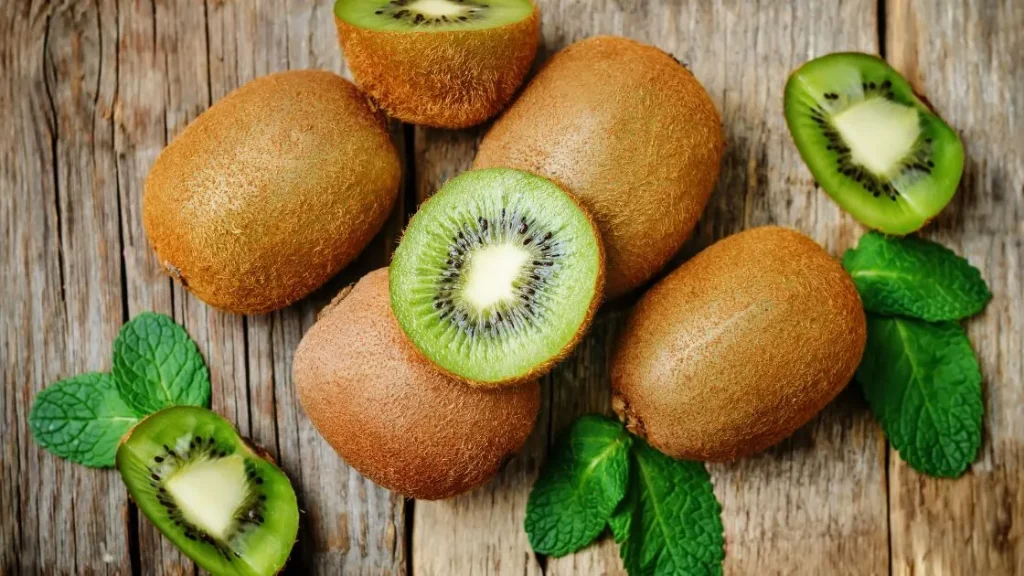
The fruit is grown commercially in many parts of the world, including Australia, California, China, Korea, and Japan.
You can either eat a kiwi fresh as a dessert or use it in recipes.
You can even preserve it by pickling or freezing it. The fruit is also used in herbal remedies and skin care products.
It is rich in vitamins C, Vitamin K, and Vitamin E.
Kiwi also contains antioxidant compounds called polyphenols.
If you want to fight off free radicals and keep your youthful glow, two kiwis a day can keep the wrinkles away.
Any historical uses?
In the past, kiwi was used in a variety of ways.
These uses included treating various ailments and providing nutritional benefits for over 700 years in China.
Furthermore, the Kahn rulers in China believed that the kiwi (or “Yang Tao,” as it was called) was a health-based aphrodisiac.
Whether or not Kiwi can help with your sex drive, we can’t really say, but it will certainly be fun to find out.
In China as well as Japan it was used to treat sore throat and skin problems.
And because of its vibrant pigment, it was even used as a dye for textiles.
Overall, the kiwi has been used in many ways throughout history and continues to be used today in different forms.
What is the ph Scale?
The pH scale in food is a measure of the acidity or alkalinity of a solution.
The pH scale measures the potential hydrogen ion concentration in a solution.
Food with a pH above 6 is considered alkaline, while a solution with less than 6 is considered acidic.
A pH level of 7 falls into the neutral range.
Overall, kiwi has a low pH level (3.2 – 3.96), making it more acidic than most other fruits, yet is still considered safe to use in an alkaline diet.
Kiwi contains an alkaline-forming compound called hesperidin.
This compound helps to balance the body’s acidity, helping to maintain a healthy pH level.
But why does this matter?
- An imbalance in pH levels can lead to a variety of health problems. For example, an acidic diet high in processed foods and sugars can cause fatigue, headaches, and mood swings.
- An alkaline-forming diet with plenty of fruits and vegetables can help to promote overall health and well-being. An increased pH level can help to support this by reducing acidity levels in the blood and tissues.
- It can support weight loss by helping to reduce overeating and cravings for unhealthy foods.
- It can also improve digestion and overall health by promoting a more balanced intestinal flora for improved gut health.
So, if you’re looking for a delicious way to improve your overall health, try incorporating kiwis into your diet! (It isn’t a punishment.)
However, it is worth mentioning that some are prone to kiwi allergies.
Alkaloid compounds can trigger a reaction, so if you are prone to allergies, best to talk to your doctor first.
Nutrition Facts About Kiwi

This fruit is a vitamin- and nutrient-rich fruit with multiple health benefits.
The high levels of vitamin C in kiwi are essential for maintaining proper immune function, cellular health, and cardiovascular health.
It also contains folate, crucial for DNA synthesis and cell growth.
Kiwi fruit is also a great source of vitamin E, which helps maintain healthy skin and hair.
Overall, it is a nutritious and beneficial food for people of all ages.
Here are more nutritional facts;
One kiwi (100g) contains the following;
- 15 grams of total carbohydrates, 3 grams of dietary fiber, and 9 grams of natural sugars. In other words, it is low in calories, but kiwi can reduce cravings for junk food.
- It contains vitamins C (92.7 mg) and E (1.46MG) as well as beta carotene (383mcg) that may help reduce the risk of various diseases. This is especially important for improved heart health
- Kiwi is an excellent source of potassium, with 100g providing more than 5 percent of the RDA for this essential mineral. Potassium helps regulate body fluid balance, muscle contraction, and nerve transmission.
Benefits of Kiwi
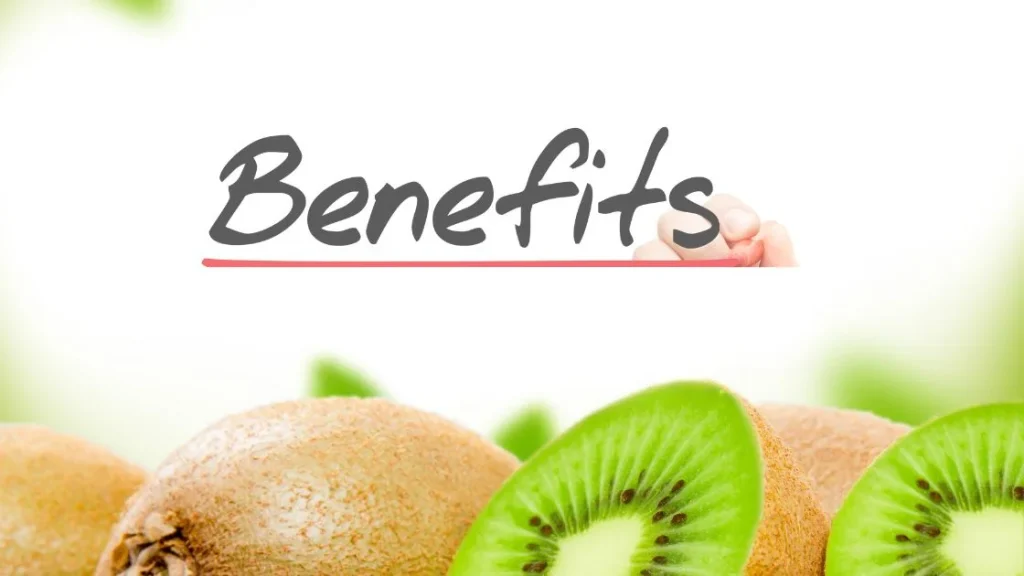
Does it have benefits in an alkaline diet?
In addition to providing various health benefits, it is also a good source of fiber and can help balance the body’s pH.
Studies showed that consuming high amounts of fruits and vegetables on an alkaline diet can help shift the pH balance toward more alkaline values, which can help to improve overall health and well-being.
List Benefits
- The high levels of potassium, vitamin C, and flavonoids in kiwi make it an excellent addition to your alkaline diet.
- The nutrients in kiwi fruits help balance out the excess acidity in your body, which can result from eating a high-sodium or acidic diet.
- Kiwi is packed with dietary fiber, which helps to promote healthy digestion and overall digestive health.
- Good source of vitamins B6 and E, which are important for maintaining proper energy levels and cellular function in your body.
- Contains magnesium(17mg), iron(0.3mg), and calcium (34mg), which are essential for you to build and maintain healthy bones and muscles.
Kiwi Recipes
Kiwi fruit is a delicious and unique fruit native to New Zealand.
It has a buttery, sweet flavor with a hint of citrus.
They are typically eaten fresh, but there are many varieties of kiwi recipes if you are feeling adventurous.
They can be eaten as is or chopped into cubes or slices.
They can be served with various toppings such as honey, butter, lemon juice, and coconut milk.
Or, use them in simple recipes such as fruit salads and smoothies.
Finally, kiwis are commonly used in desserts such as pies and ice creams.
So, enjoy the delicious goodness of kiwis no matter how you choose to snack on them!
You can use kiwi fruit in various recipes, including smoothies, salads, and desserts.
Here are some delicious kiwi recipes to try:
Kiwi Salad With Honey Dijon Vinaigrette:
A classic salad made with fresh kiwifruit is a delicious summertime treat.
Mix the fruit with chopped greens, nuts, and cheese to make this dish.
For a variation on the theme, try substituting honeydew melon or cantaloupe for the kiwifruit.
Ingredients:
- 1 1/2 cups diced kiwis
- 1 orange, peeled and cubed
- 2 cups diced strawberries
- 1 cup pitted apricots, chopped
- 1/4 cup Golden raisins or currants (optional)
Honey Dijon Vinaigrette:
- 2 tablespoons Dijon mustard
- 1 tablespoon honey
- 3 tablespoons olive oil (alternatively, you can substitute regular old mayonnaise if you don’t have Dijon available)
Kiwi Fruit Cheesecake
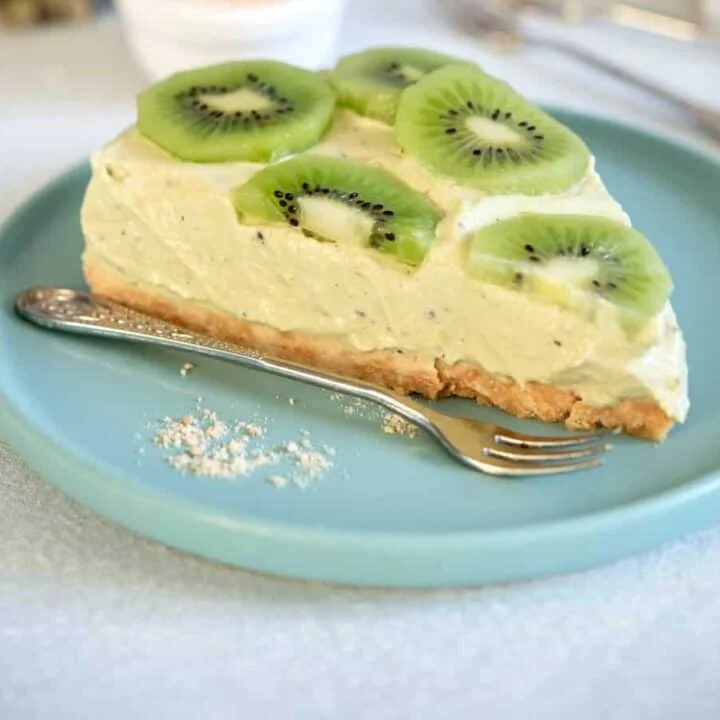
This puts an exciting twist on traditional cheesecake.
This creamy and dreamy dessert contains vitamins, nutrients, and flavor.
It can be served as a refreshing summertime treat, or you can use it to add some variety to your dessert table during the holidays.
(Remember – if you are keeping an eye on your waist, keep an eye on your portions!)
Ingredients
- 1/2 cup (120 grams) cream cheese, softened
- 1/4 cup (50 grams) butter, softened
- 3 large eggs
- 1 teaspoon vanilla extract
- 2 kiwi fruit, peeled and finely chopped.
Instructions:
To make the kiwi fruit cheesecake, you will need to prepare the base first.
This is a mixture of cream cheese, butter, sugar, and eggs.
Next, you will add in the kiwi fruit puree and spices.
Wait until this mixture is fully set before adding the rest of the ingredients, such as cheese and milk.
The final step is to bake the cheesecake until it’s golden brown and set. Enjoy!
All The Ways to Eat Kiwi
It is important to note that an alkaline diet should not be considered a quick fix for health problems but rather a long-term lifestyle change.
This includes eating a variety of foods that and healthy and beneficial to maintaining a balanced overall diet.
Kiwi is not exactly a new fruit – but kiwi is a superfood!
Its nutritional profile is impressive per serving – look at all the healthy goodness it contains.
By consuming kiwi daily in a balanced alkaline diet, you can enjoy a range of positive health benefits – while enjoying a tasty treat.

Reinette Robbertze is a highly qualified professional in the health and nutrition industry, having completed both Journalism and Nutrition diplomas. With a remarkable portfolio of health blogs and magazine articles to her name, Reinette’s writing is fueled by her genuine passion for healthy living. Drawing on her academic background, Reinette delivers authentic and insightful information to her readers. Her engaging writing style, blended with personal anecdotes, creates an immersive experience that keeps readers engaged and informed. Keep following her work for the latest updates and informative articles on health and nutrition.
